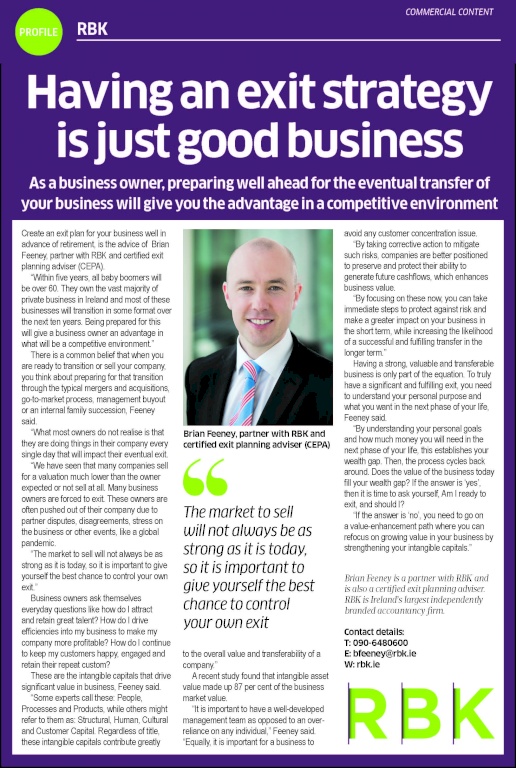Published in the Business Post - 26th September 2021
As a business owner, preparing well ahead for the eventual transfer of your business will give you the advantage in a competitive environment.
Create an exit plan for your business well in advance of retirement, is the advice of Brian Feeney, partner with RBK and certified exit planning adviser (CEPA).
“Within five years, all baby boomers will be over 60. They own the vast majority of private business in Ireland and most of these businesses will transition in some format over the next ten years. Being prepared for this will give a business owner an advantage in what will be a competitive environment.”
There is a common belief that when you are ready to transition or sell your company, you think about preparing for that transition through the typical mergers and acquisitions, go-to-market process, management buyout or an internal family succession, Feeney said.
“What most owners do not realise is that they are doing things in their company every single day that will impact their eventual exit. “We have seen that many companies sell for a valuation much lower than the owner expected or not sell at all. Many business owners are forced to exit. These owners are often pushed out of their company due to partner disputes, disagreements, stress on the business or other events, like a global pandemic.
“The market to sell will not always be as strong as it is today, so it is important to give yourself the best chance to control your own exit.”
Business owners ask themselves everyday questions like how do I attract and retain great talent? How do I drive efficiencies into my business to make my company more profitable? How do I continue to keep my customers happy, engaged and retain their repeat custom?
These are the intangible capitals that drive significant value in business, Feeney said. “Some experts call these: People, Processes and Products, while others might refer to them as: Structural, Human, Cultural and Customer Capital. Regardless of title, these intangible capitals contribute greatly to the overall value and transferability of a company.”
A recent study found that intangible asset value made up 87 per cent of the business market value.
“It is important to have a well-developed management team as opposed to an overreliance on any individual,” Feeney said. “Equally, it is important for a business to avoid any customer concentration issue. “By taking corrective action to mitigate such risks, companies are better positioned to preserve and protect their ability to generate future cashflows, which enhances business value.
“By focusing on these now, you can take immediate steps to protect against risk and make a greater impact on your business in the short term, while increasing the likelihood of a successful and fulfilling transfer in the longer term.”
Having a strong, valuable and transferable business is only part of the equation. To truly have a significant and fulfilling exit, you need to understand your personal purpose and what you want in the next phase of your life, Feeney said.
“By understanding your personal goals and how much money you will need in the next phase of your life, this establishes your wealth gap. Then, the process cycles back around. Does the value of the business today fill your wealth gap? If the answer is ‘yes’, then it is time to ask yourself, Am I ready to exit, and should I? “If the answer is ‘no’, you need to go on a value-enhancement path where you can refocus on growing value in your business by strengthening your intangible capitals.”
Brian Feeney is a partner with RBK and is also a certified exit planning adviser. RBK is Ireland’s largest independently branded accountancy firm.
Published in the Business Post - 26th September 2021



